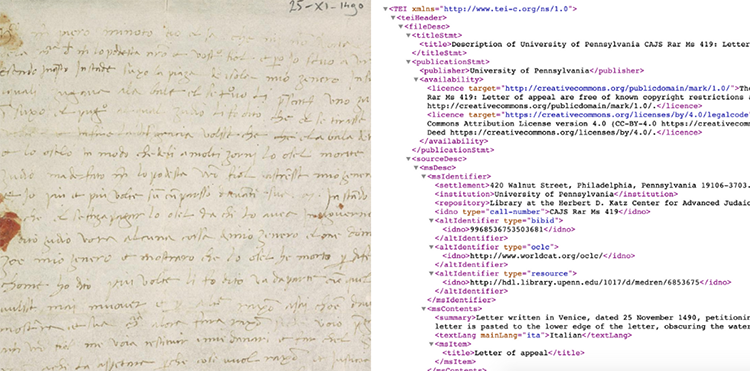Perelman School of Medicine 2021 Teaching Awards
Dean’s Award for Excellence in Clinical Teaching (at an Affiliated Hospital)
The Dean’s Award for Excellence in Clinical Teaching was established in 1989 to recognize clinical teaching excellence and commitment to medical education by outstanding faculty members from affiliated hospitals. One or more Dean’s Awards are given annually, the recipients being selected on the advice of a committee composed of faculty and students. This year there are four recipients.
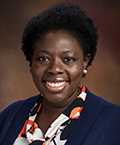 Adelaide Barnes is an assistant professor of clinical pediatrics within the section of hospital medicine at the Children’s Hospital of Philadelphia (CHOP). Dr. Barnes received her bachelor of arts in sociology from Duke University and obtained her medical doctorate from the George Washington University School of Medicine and Health Sciences. She completed her pediatric residency training at CHOP. After completing her residency, she served as a Pediatric Chief Resident for the hospital and the pediatric residency program. Dr. Barnes remains active in the pediatric residency program, serving as an associate program director, chair of the Intern Selection Committee, and director of the Global Health Track. She also sits on the CHOP Diversity Council and the division of general pediatrics Committee on Faculty Diversity and Equity and is a department of pediatrics representative for the Executive Committee of the Medical Staff Committee on Diversity and Inclusion. Dr. Barnes serves as a faculty mentor for the Alliance of Multicultural Physicians, a resident-led organization at CHOP comprised of residents, fellows, and attending physicians who are under-represented in medicine and committed to creating a diverse workforce that affords the best and most culturally competent care to CHOP’s patients and families. One of her former trainees commented, “Dr. Barnes is an outstanding clinician educator, leader, mentor and role model. She has led by example, inspiring others—particularly medical students and trainees—with a commitment to excellence, a joy of pursuing and sharing knowledge and above all, a palpable love for her patients.”
Adelaide Barnes is an assistant professor of clinical pediatrics within the section of hospital medicine at the Children’s Hospital of Philadelphia (CHOP). Dr. Barnes received her bachelor of arts in sociology from Duke University and obtained her medical doctorate from the George Washington University School of Medicine and Health Sciences. She completed her pediatric residency training at CHOP. After completing her residency, she served as a Pediatric Chief Resident for the hospital and the pediatric residency program. Dr. Barnes remains active in the pediatric residency program, serving as an associate program director, chair of the Intern Selection Committee, and director of the Global Health Track. She also sits on the CHOP Diversity Council and the division of general pediatrics Committee on Faculty Diversity and Equity and is a department of pediatrics representative for the Executive Committee of the Medical Staff Committee on Diversity and Inclusion. Dr. Barnes serves as a faculty mentor for the Alliance of Multicultural Physicians, a resident-led organization at CHOP comprised of residents, fellows, and attending physicians who are under-represented in medicine and committed to creating a diverse workforce that affords the best and most culturally competent care to CHOP’s patients and families. One of her former trainees commented, “Dr. Barnes is an outstanding clinician educator, leader, mentor and role model. She has led by example, inspiring others—particularly medical students and trainees—with a commitment to excellence, a joy of pursuing and sharing knowledge and above all, a palpable love for her patients.”
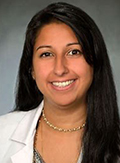 D. Rani Nandiwada is an assistant professor of clinical medicine who focuses on general internal medicine in the outpatient and inpatient clinical settings. She was a primary care resident and then chief resident at NYU, followed by a general internal medicine fellowship in medical education and a master’s in medical education from the University of Pittsburgh. She has been a faculty member at the University of Pennsylvania for the past five years and serves as the director of the Medical Education and Leadership track for the Internal Medicine Residency, and course director of the Outpatient Externship and the MS1 Foundations of Healthcare Systems course. She also has co-created a Frontiers in Primary Care and Health Systems Science elective for senior medical students. Her medical education focus is on teaching health systems science to trainees across the undergraduate and graduate spectrum, teaching how to teach, and clinical topics around addiction medicine. She was a faculty inductee into the Alpha Omega Alpha Medical Honor Society in 2019. As one student said during teaching evaluations, “my clinical experiences often have an almost ‘meta’ quality to them as I feel that we not only discuss the clinical care, but how to think about how the experience impacted my own learning and what about it could be changed during future experiences.”
D. Rani Nandiwada is an assistant professor of clinical medicine who focuses on general internal medicine in the outpatient and inpatient clinical settings. She was a primary care resident and then chief resident at NYU, followed by a general internal medicine fellowship in medical education and a master’s in medical education from the University of Pittsburgh. She has been a faculty member at the University of Pennsylvania for the past five years and serves as the director of the Medical Education and Leadership track for the Internal Medicine Residency, and course director of the Outpatient Externship and the MS1 Foundations of Healthcare Systems course. She also has co-created a Frontiers in Primary Care and Health Systems Science elective for senior medical students. Her medical education focus is on teaching health systems science to trainees across the undergraduate and graduate spectrum, teaching how to teach, and clinical topics around addiction medicine. She was a faculty inductee into the Alpha Omega Alpha Medical Honor Society in 2019. As one student said during teaching evaluations, “my clinical experiences often have an almost ‘meta’ quality to them as I feel that we not only discuss the clinical care, but how to think about how the experience impacted my own learning and what about it could be changed during future experiences.”
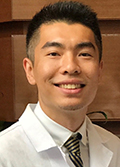 Yu-Heng Guo is a clinical assistant professor in the department of psychiatry at the University of Pennsylvania, and is also the director of inpatient psychiatry at the Corporal Michael J. Crescenz Veterans Affairs Medical Center. Medical students, psychiatry residents, and addiction psychiatry fellows rotate with him on an inpatient psychiatry dual diagnosis unit, where they treat a lot of veterans with substance use disorders as well as PTSD. In addition, Dr. Guo is the faculty advisor for the Asian Pacific American Medical Student Association at the Perelman School of Medicine at Penn, and is also the director of the cultural psychiatry curriculum for the psychiatry residents at Penn. Dr. Guo enjoys mentoring trainees in their clinical, personal, and professional growth, with the hope that they will become not only better clinicians for Penn patients, but for the Philadelphia community as well. One former trainee commented that, “Dr. Guo is an excellent clinical teacher and is exceptionally organized in his approach to teaching medical students, residents and fellows. For this, he has become one of the most admired attendings by medical students, residents, and fellows alike.”
Yu-Heng Guo is a clinical assistant professor in the department of psychiatry at the University of Pennsylvania, and is also the director of inpatient psychiatry at the Corporal Michael J. Crescenz Veterans Affairs Medical Center. Medical students, psychiatry residents, and addiction psychiatry fellows rotate with him on an inpatient psychiatry dual diagnosis unit, where they treat a lot of veterans with substance use disorders as well as PTSD. In addition, Dr. Guo is the faculty advisor for the Asian Pacific American Medical Student Association at the Perelman School of Medicine at Penn, and is also the director of the cultural psychiatry curriculum for the psychiatry residents at Penn. Dr. Guo enjoys mentoring trainees in their clinical, personal, and professional growth, with the hope that they will become not only better clinicians for Penn patients, but for the Philadelphia community as well. One former trainee commented that, “Dr. Guo is an excellent clinical teacher and is exceptionally organized in his approach to teaching medical students, residents and fellows. For this, he has become one of the most admired attendings by medical students, residents, and fellows alike.”
 Zheya Jenny Yu is a child and adult psychiatrist and a clinical assistant professor of psychiatry at the University of Pennsylvania. Dr. Yu came to the United States to pursue a PhD in molecular genetics after completing her medical education at Tongji Medical School in Wuhan and a master’s degree in public health with a focus on environmental medicine at Shanghai Medical College. A strong desire to make direct impact on people’s lives, especially for those who suffer severe mental illnesses, led Dr. Yu to pursue clinical trainings in adult and child psychiatry, eventually finishing a child psychiatry fellowship at CHOP. Dr. Yu has devoted much of her professional life to advocating for, educating, and serving the Asian families affected by mental illness in greater Philadelphia. Dr. Yu strongly believes that her responsibility is not only to treat her patients’ specific illnesses, but also to foster the health and wellbeing of the younger generation and encourage them to pursue their dreams. She has also strived to promote clinical research, especially in the Asian community, where data is still limited. While serving as a member of the Culture and Diversity Committee of the American Academy of Child & Adolescent Psychiatry (AACAP) from 2010 to 2017, Dr. Yu delivered many lectures and co-authored a book chapter on mental health in Asian youth and also helped establish an International Medical Graduate Caucus within AACAP. Called upon by the urgent needs of the Asian community, in 2018 Dr. Yu launched a free weekly peer support group, “Achieving Harmony for Asian Adolescents,” in partnership with the Teen Club Program at the Philadelphia Chinatown Development Corporation (PCDC). This partnership laid a strong foundation for further collaboration between PCDC and Dr. Yu on behalf of Penn Medicine. Dr. Yu won a Chinese Immigrant Family Wellness grant in 2019 from the Scattergood Foundation with a focus on leadership development and building intergenerational connections. She was twice the recipient of the Penn Medicine CAREs grant (2012 and 2020), which has supported her work in the community, and she has delivered her workshop on this topic to educators, counselors, and parents in schools, churches and Zoom spaces in greater Philadelphia. Dr. Yu was interviewed by the Philadelphia Inquirer and a Rosalynn Carter Mental Health Journalism fellow about mental health topics in Asian youth. Dr. Yu is honored for having had the opportunity to learn from so many medical students and residents she has worked with. As Confucius said: “All those I walk with will serve as my teachers.” One of her former trainees stated that “she was an excellent teacher and mentor for the use of a cultural psychiatry lens and greatly contributed to my interest in working with minority groups. She balanced a hands-off teaching style with adequate supervision, helping me grow tremendously toward being an independent psychiatrist.”
Zheya Jenny Yu is a child and adult psychiatrist and a clinical assistant professor of psychiatry at the University of Pennsylvania. Dr. Yu came to the United States to pursue a PhD in molecular genetics after completing her medical education at Tongji Medical School in Wuhan and a master’s degree in public health with a focus on environmental medicine at Shanghai Medical College. A strong desire to make direct impact on people’s lives, especially for those who suffer severe mental illnesses, led Dr. Yu to pursue clinical trainings in adult and child psychiatry, eventually finishing a child psychiatry fellowship at CHOP. Dr. Yu has devoted much of her professional life to advocating for, educating, and serving the Asian families affected by mental illness in greater Philadelphia. Dr. Yu strongly believes that her responsibility is not only to treat her patients’ specific illnesses, but also to foster the health and wellbeing of the younger generation and encourage them to pursue their dreams. She has also strived to promote clinical research, especially in the Asian community, where data is still limited. While serving as a member of the Culture and Diversity Committee of the American Academy of Child & Adolescent Psychiatry (AACAP) from 2010 to 2017, Dr. Yu delivered many lectures and co-authored a book chapter on mental health in Asian youth and also helped establish an International Medical Graduate Caucus within AACAP. Called upon by the urgent needs of the Asian community, in 2018 Dr. Yu launched a free weekly peer support group, “Achieving Harmony for Asian Adolescents,” in partnership with the Teen Club Program at the Philadelphia Chinatown Development Corporation (PCDC). This partnership laid a strong foundation for further collaboration between PCDC and Dr. Yu on behalf of Penn Medicine. Dr. Yu won a Chinese Immigrant Family Wellness grant in 2019 from the Scattergood Foundation with a focus on leadership development and building intergenerational connections. She was twice the recipient of the Penn Medicine CAREs grant (2012 and 2020), which has supported her work in the community, and she has delivered her workshop on this topic to educators, counselors, and parents in schools, churches and Zoom spaces in greater Philadelphia. Dr. Yu was interviewed by the Philadelphia Inquirer and a Rosalynn Carter Mental Health Journalism fellow about mental health topics in Asian youth. Dr. Yu is honored for having had the opportunity to learn from so many medical students and residents she has worked with. As Confucius said: “All those I walk with will serve as my teachers.” One of her former trainees stated that “she was an excellent teacher and mentor for the use of a cultural psychiatry lens and greatly contributed to my interest in working with minority groups. She balanced a hands-off teaching style with adequate supervision, helping me grow tremendously toward being an independent psychiatrist.”
Robert Dunning Dripps Memorial Award for Excellence in Graduate Medical Education
This award was established by the department of anesthesia in 1984. As a pioneer in the specialty of anesthesia and chair of the department from 1943 to 1972, Dr. Dripps was instrumental in the training of more than 300 residents and fellows, many of whom went on to chair other departments. This award is to recognize excellence as an educator of residents and fellows in clinical care, research, teaching, or administration.
 Todd Barton is a professor of clinical medicine in the division of infectious diseases. He came to Penn in 1997 for an internship and residency and stayed through the completion of a chief resident year and a fellowship in infectious diseases. Dr. Barton has enjoyed teaching and learning from medical trainees ranging from first-year medical students to senior infectious diseases fellows over his 18 years on the faculty, and currently serves as program director for the Internal Medicine Residency program. He maintains inpatient clinical work in general internal medicine, HIV, and general infectious diseases. Dr. Barton is also a council member in the Association of Program Directors in Internal Medicine and an occasional participant in local community theater productions. A former trainee commented that “Dr. Barton has been an invaluable educator in my training and I am incredibly grateful for his mentorship. He has taught me and countless other trainees about rigorous evaluation of patient presentations, embracing and enjoying the complexity and uncertainty of medicine. I cannot think of anyone who would be more deserving.”
Todd Barton is a professor of clinical medicine in the division of infectious diseases. He came to Penn in 1997 for an internship and residency and stayed through the completion of a chief resident year and a fellowship in infectious diseases. Dr. Barton has enjoyed teaching and learning from medical trainees ranging from first-year medical students to senior infectious diseases fellows over his 18 years on the faculty, and currently serves as program director for the Internal Medicine Residency program. He maintains inpatient clinical work in general internal medicine, HIV, and general infectious diseases. Dr. Barton is also a council member in the Association of Program Directors in Internal Medicine and an occasional participant in local community theater productions. A former trainee commented that “Dr. Barton has been an invaluable educator in my training and I am incredibly grateful for his mentorship. He has taught me and countless other trainees about rigorous evaluation of patient presentations, embracing and enjoying the complexity and uncertainty of medicine. I cannot think of anyone who would be more deserving.”
Blockley-Osler Award
Created in 1987 by the Blockley Section of the Philadelphia College of Physicians, this award is given annually to a member of the faculty at an affiliated hospital for excellence in teaching modern clinical medicine at the bedside in the tradition of Dr. William Osler and others who taught at Philadelphia General Hospital.
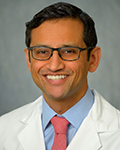 Ashok Linganna is an assistant professor of clinical medicine and an academic hospitalist at the Hospital of the University of Pennsylvania (HUP). He came to the University of Pennsylvania in 2015 after completing his internal medicine residency and chief residency at the University of California, Irvine. Since arriving in Philadelphia, he has focused his energy on the needs of undergraduate and graduate learners. For the past five years, he has served as the co-director of the sub-internship for internal medicine and was recently named the associate director of undergraduate medical education in internal medicine. During this time, he obtained a master’s degree in medical education from Penn and has become renowned for his educational prowess, earning a Penn Pearl and the John M. Eisenberg Teaching award. Further, in 2020, he was inducted into Alpha Omega Alpha Medical Honor Society and the Gold Humanism Honor Society. A former resident stated that “through his dedication to teaching, he has touched the lives of innumerable medical students, residents, and patients.”
Ashok Linganna is an assistant professor of clinical medicine and an academic hospitalist at the Hospital of the University of Pennsylvania (HUP). He came to the University of Pennsylvania in 2015 after completing his internal medicine residency and chief residency at the University of California, Irvine. Since arriving in Philadelphia, he has focused his energy on the needs of undergraduate and graduate learners. For the past five years, he has served as the co-director of the sub-internship for internal medicine and was recently named the associate director of undergraduate medical education in internal medicine. During this time, he obtained a master’s degree in medical education from Penn and has become renowned for his educational prowess, earning a Penn Pearl and the John M. Eisenberg Teaching award. Further, in 2020, he was inducted into Alpha Omega Alpha Medical Honor Society and the Gold Humanism Honor Society. A former resident stated that “through his dedication to teaching, he has touched the lives of innumerable medical students, residents, and patients.”
Leonard Berwick Memorial Teaching Award
This memorial was established in 1981 as a memorial to Leonard Berwick by his family and the department of pathology. It recognizes “a member of the medical faculty who in his or her teaching effectively fuses basic science and clinical medicine.” It is intended that this award recognize persons who are outstanding teachers, particularly among younger faculty.
 Jonathan Dunham is an associate professor of clinical medicine in the division of rheumatology and an advisory dean in the Perelman School of Medicine. Dr. Dunham completed medical school at the University of Medicine and Dentistry of New Jersey—Robert Wood Johnson Medical School, an internal medicine residency at Temple University, and a rheumatology fellowship at the University of Pennsylvania. Dr. Dunham has directed the rheumatology section of the Mechanisms of Disease and Therapeutic Interventions (MDTI) first-year course at PSOM since 2011. In response to student feedback, he undertook a significant curricular redesign with substantial improvements in the course ranking in subsequent years. In addition to curricular development for the course, he also lectures in MDTI and in the first-year Cell and Tissue Biology course, where he gives a lecture on cartilage biology. Dr. Dunham’s teaching efforts have been consistently recognized by medical students. In addition, Dr. Dunham is the course director for the clinical rheumatology elective, where he teaches third- and fourth-year medical students in his outpatient clinic, and is a regular faculty preceptor in the Doctoring course at PSOM. One medical student commented that Dr. Dunham is “really engaging and approachable. He ensures students understand concepts through using comprehensible language and explanations for challenging concepts.”
Jonathan Dunham is an associate professor of clinical medicine in the division of rheumatology and an advisory dean in the Perelman School of Medicine. Dr. Dunham completed medical school at the University of Medicine and Dentistry of New Jersey—Robert Wood Johnson Medical School, an internal medicine residency at Temple University, and a rheumatology fellowship at the University of Pennsylvania. Dr. Dunham has directed the rheumatology section of the Mechanisms of Disease and Therapeutic Interventions (MDTI) first-year course at PSOM since 2011. In response to student feedback, he undertook a significant curricular redesign with substantial improvements in the course ranking in subsequent years. In addition to curricular development for the course, he also lectures in MDTI and in the first-year Cell and Tissue Biology course, where he gives a lecture on cartilage biology. Dr. Dunham’s teaching efforts have been consistently recognized by medical students. In addition, Dr. Dunham is the course director for the clinical rheumatology elective, where he teaches third- and fourth-year medical students in his outpatient clinic, and is a regular faculty preceptor in the Doctoring course at PSOM. One medical student commented that Dr. Dunham is “really engaging and approachable. He ensures students understand concepts through using comprehensible language and explanations for challenging concepts.”
Scott Mackler Award for Excellence in Substance Abuse Teaching
This award was established in 2000 by the Penn/VA Center for Studies of Addiction and the department of psychiatry. Scott Mackler is known for his excellence in teaching medical students, residents, post-doctoral fellows, nurses, and other Penn faculty in many different departments in the area of substance abuse.
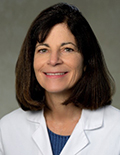 Jeanmarie Perrone is a professor of emergency medicine, the director of the division of medical toxicology, and the founding director of the Penn Medicine Center for Addiction Medicine and Policy, which addresses the challenges of substance use disorders in the Philadelphia community and advances Penn Medicine as a leader in addiction medicine education and substance use treatment and research. Over the past decade, her influence and impact in this area have been singularly impressive. Dr. Perrone led the judicious response to early reports of opioid overprescribing and has educated students, trainees, and faculty about opioid alternatives to mitigate overprescribing and the prescription drug problem. In 2011, she brought forth internal and external data to Penn’s health system to convene the health system’s opioid stewardship task force, which has proceeded to substantially de-escalate opioid prescribing through educational initiatives and feedback to providers. She has supported a multitude of students, trainees, and fellows to develop opioid-focused research directions and mentored their progression through continued engagement in opioid related policy and treatment initiatives. In addition to teaching the tenets of pharmacology, overdose management and prevention strategies to students and trainees, she has developed a learning module that addresses state requirements for opioid education, which has been completed by thousands of health system clinicians. She has provided content expertise that influences opioid policy at the FDA, CDC, National Quality Forum, and the Pennsylvania state legislature. Pivoting from “de-prescribing,” she is leading the development of multiple pathways for treatment of opioid use disorder directly from the emergency department and expanding them in the health system, streamlining processes in collaboration with primary care clinicians and hospitalists. She is spearheading system efforts to prepare students, trainees, and faculty in the additional training mandated to prescribe medications to treat opioid use disorder and has highlighted patient narratives of successful treatment to engage students and colleagues in local efforts to develop a destigmatizing culture of low barrier treatment. One of her former trainees wrote, “all Penn residents, medical students, faculty members, and nurses who spent time in the ED are lucky to have learned from her leadership, expertise and dedication to SUD patients. There is no other faculty member in the Penn health care system who has garnered such a diverse classroom of students and imparted them with the capacity to make substantive, everlasting change in SUD patient care.”
Jeanmarie Perrone is a professor of emergency medicine, the director of the division of medical toxicology, and the founding director of the Penn Medicine Center for Addiction Medicine and Policy, which addresses the challenges of substance use disorders in the Philadelphia community and advances Penn Medicine as a leader in addiction medicine education and substance use treatment and research. Over the past decade, her influence and impact in this area have been singularly impressive. Dr. Perrone led the judicious response to early reports of opioid overprescribing and has educated students, trainees, and faculty about opioid alternatives to mitigate overprescribing and the prescription drug problem. In 2011, she brought forth internal and external data to Penn’s health system to convene the health system’s opioid stewardship task force, which has proceeded to substantially de-escalate opioid prescribing through educational initiatives and feedback to providers. She has supported a multitude of students, trainees, and fellows to develop opioid-focused research directions and mentored their progression through continued engagement in opioid related policy and treatment initiatives. In addition to teaching the tenets of pharmacology, overdose management and prevention strategies to students and trainees, she has developed a learning module that addresses state requirements for opioid education, which has been completed by thousands of health system clinicians. She has provided content expertise that influences opioid policy at the FDA, CDC, National Quality Forum, and the Pennsylvania state legislature. Pivoting from “de-prescribing,” she is leading the development of multiple pathways for treatment of opioid use disorder directly from the emergency department and expanding them in the health system, streamlining processes in collaboration with primary care clinicians and hospitalists. She is spearheading system efforts to prepare students, trainees, and faculty in the additional training mandated to prescribe medications to treat opioid use disorder and has highlighted patient narratives of successful treatment to engage students and colleagues in local efforts to develop a destigmatizing culture of low barrier treatment. One of her former trainees wrote, “all Penn residents, medical students, faculty members, and nurses who spent time in the ED are lucky to have learned from her leadership, expertise and dedication to SUD patients. There is no other faculty member in the Penn health care system who has garnered such a diverse classroom of students and imparted them with the capacity to make substantive, everlasting change in SUD patient care.”
Dean’s Award for Excellence in Basic Science Teaching
The Dean’s Award for Excellence in Basic Science Teaching was established in 1988 to recognize teaching excellence and commitment to medical student teaching in the basic sciences. One or more Dean’s Awards are given annually, the recipients being selected on the advice of a committee comprised of faculty and students. This year there are two recipients.
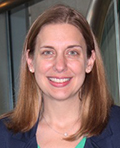 Rebecca Ahrens-Nicklas is an assistant professor of pediatrics in the division of human genetics. Dr. Ahrens-Nicklas taught middle school and high school science before completing her combined MD/PhD training at the Weill Cornell/Rockefeller/Sloan-Kettering Tri-Institutional program. She completed a combined residency in pediatrics and clinical genetics and a fellowship in medical biochemical genetics at CHOP before joining the faculty of PSOM. She is an attending with the biochemical genetics service at CHOP and specializes in the care of children with rare inherited metabolic disorders. She also leads a translational research laboratory focused on understanding the mechanisms underlying neurometabolic disorders, with the goal of developing better therapies. She participates in the neuroscience and genetics & epigenetics graduate groups and teaches within the MS1 genetics course. Mentoring postdoctoral fellows and graduate, medical, and undergraduate students has been the highlight of her time at Penn. One of her colleagues commented that “Dr. Ahrens-Nicklas always goes above and beyond to help everyone around her, from her patients to her students to her colleagues. Her love for her work makes her an incredible teacher and mentor.”
Rebecca Ahrens-Nicklas is an assistant professor of pediatrics in the division of human genetics. Dr. Ahrens-Nicklas taught middle school and high school science before completing her combined MD/PhD training at the Weill Cornell/Rockefeller/Sloan-Kettering Tri-Institutional program. She completed a combined residency in pediatrics and clinical genetics and a fellowship in medical biochemical genetics at CHOP before joining the faculty of PSOM. She is an attending with the biochemical genetics service at CHOP and specializes in the care of children with rare inherited metabolic disorders. She also leads a translational research laboratory focused on understanding the mechanisms underlying neurometabolic disorders, with the goal of developing better therapies. She participates in the neuroscience and genetics & epigenetics graduate groups and teaches within the MS1 genetics course. Mentoring postdoctoral fellows and graduate, medical, and undergraduate students has been the highlight of her time at Penn. One of her colleagues commented that “Dr. Ahrens-Nicklas always goes above and beyond to help everyone around her, from her patients to her students to her colleagues. Her love for her work makes her an incredible teacher and mentor.”
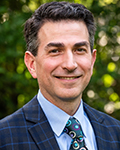 Daniel Wolf grew up in Los Angeles, completed undergraduate work at Harvard College, his MD and PhD training at Yale University, a psychiatry residency at MGH-McLean, and a neuropsychiatry fellowship at Penn. He is an associate professor in the neurodevelopment and psychosis section of the PSOM psychiatry department, where he is devoted to a wide range of teaching and mentoring roles. As an outpatient attending psychiatrist, he teaches residents and medical students how to provide longitudinal care to individuals with psychotic disorders. As head of the Laboratory for Motivation in Psychiatry and associate director of the Psychosis T32 Training Program, he provides research supervision and career development mentorship to trainees studying the pathophysiology of psychosis and of motivation impairment. He lectures on the neurobiology of psychosis in the Brain and Behavior course for medical students, as well as in didactic courses for psychiatry residents, psychology graduate students, and nursing students. As director of the Clinical Neurosciences Training Program (CNST), he organizes seminars and mentoring programs for medical and graduate students interested in translating between basic neuroscience research and clinical care. In 2020 he chaired a psychiatry department task force that reviewed and recommended changes across the spectrum of undergraduate medical education efforts in the department. A medical student wrote: “Dr. Wolf has been instrumental toward mine and countless other medical students’ professional development and engagement with the neurosciences. Dr. Wolf inspires me on a near-daily basis with his genuine enthusiasm for the neurosciences and his unwavering commitment to teaching. His clear, engaging lectures on the neurobiology underlying psychosis turned a particularly challenging topic into one of the highlights of the medical school didactic material. Dr. Wolf’s multifold service to students at the Perelman School of Medicine is second to none.”
Daniel Wolf grew up in Los Angeles, completed undergraduate work at Harvard College, his MD and PhD training at Yale University, a psychiatry residency at MGH-McLean, and a neuropsychiatry fellowship at Penn. He is an associate professor in the neurodevelopment and psychosis section of the PSOM psychiatry department, where he is devoted to a wide range of teaching and mentoring roles. As an outpatient attending psychiatrist, he teaches residents and medical students how to provide longitudinal care to individuals with psychotic disorders. As head of the Laboratory for Motivation in Psychiatry and associate director of the Psychosis T32 Training Program, he provides research supervision and career development mentorship to trainees studying the pathophysiology of psychosis and of motivation impairment. He lectures on the neurobiology of psychosis in the Brain and Behavior course for medical students, as well as in didactic courses for psychiatry residents, psychology graduate students, and nursing students. As director of the Clinical Neurosciences Training Program (CNST), he organizes seminars and mentoring programs for medical and graduate students interested in translating between basic neuroscience research and clinical care. In 2020 he chaired a psychiatry department task force that reviewed and recommended changes across the spectrum of undergraduate medical education efforts in the department. A medical student wrote: “Dr. Wolf has been instrumental toward mine and countless other medical students’ professional development and engagement with the neurosciences. Dr. Wolf inspires me on a near-daily basis with his genuine enthusiasm for the neurosciences and his unwavering commitment to teaching. His clear, engaging lectures on the neurobiology underlying psychosis turned a particularly challenging topic into one of the highlights of the medical school didactic material. Dr. Wolf’s multifold service to students at the Perelman School of Medicine is second to none.”
Dean’s Award for Excellence in Medical Student Teaching by an Allied Health Professional
This award was established in 1997 to recognize outstanding teaching by allied health professionals (e.g.; nurses, physician’s assistants, emergency medical technicians). The recipient is selected on the advice of a committee composed of faculty and students.
 Lily Feldman is a physician assistant in the emergency medicine department. She studied nutrition and dietetics at the University of Vermont, where she obtained her bachelor’s degree in science and played varsity soccer. She worked in athletics as a personal trainer at the University of Pittsburgh Medical Center before attending Drexel University for her graduate studies as a PA. She has been working at HUP since 2017 and has worked both in the emergency department observation unit and the EDs at HUP and Penn Presbyterian Hospital. Ms. Feldman helps to run the emergency department’s APP educational committee. She is responsible for the management of physician assistant students from various local physician assistant programs, including those at Drexel University and Arcadia University. She also helps in assisting hopeful Pennsylvania school candidates to meet their shadowing hour needs. She has a passion for teaching students not only about emergency medicine specifically, but also about the importance of staying up to date on literature and current guidelines throughout the medical field. She loves practicing clinically and taking care of Penn’s local patients. One of her favorite parts of working in the emergency medicine department is the role that she has in teaching patients about their diagnosis and helping to coordinate care once they are discharged. A former student stated that “Lily offered me a well-rounded experience in emergency medicine. The advocacy that Lily demonstrated for me as her student did not go unnoticed and her commitment to excellence and teaching make her a great mentor.”
Lily Feldman is a physician assistant in the emergency medicine department. She studied nutrition and dietetics at the University of Vermont, where she obtained her bachelor’s degree in science and played varsity soccer. She worked in athletics as a personal trainer at the University of Pittsburgh Medical Center before attending Drexel University for her graduate studies as a PA. She has been working at HUP since 2017 and has worked both in the emergency department observation unit and the EDs at HUP and Penn Presbyterian Hospital. Ms. Feldman helps to run the emergency department’s APP educational committee. She is responsible for the management of physician assistant students from various local physician assistant programs, including those at Drexel University and Arcadia University. She also helps in assisting hopeful Pennsylvania school candidates to meet their shadowing hour needs. She has a passion for teaching students not only about emergency medicine specifically, but also about the importance of staying up to date on literature and current guidelines throughout the medical field. She loves practicing clinically and taking care of Penn’s local patients. One of her favorite parts of working in the emergency medicine department is the role that she has in teaching patients about their diagnosis and helping to coordinate care once they are discharged. A former student stated that “Lily offered me a well-rounded experience in emergency medicine. The advocacy that Lily demonstrated for me as her student did not go unnoticed and her commitment to excellence and teaching make her a great mentor.”
Dean’s Award for Excellence in Clinical Teaching by Housestaff
This award was established in 2015 to recognize clinical teaching excellence and commitment to medical education by outstanding housestaff. One award is given annually. The recipient is selected on the advice of a committee composed of faculty and students.
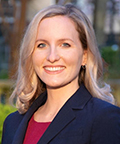 Leigh Ann Humphries is completing the final year of her residency in obstetrics and gynecology at the Hospital of the University of Pennsylvania and is the chief resident for medical education. She will continue her training as a fellow in reproductive endocrinology and infertility at HUP. She received her medical degree from Harvard Medical School, where she led an interest group dedicated to educating and empowering women to pursue surgical specialties. While at Penn, she has been committed to teaching medical students and residents in every setting from the clinic to the operating room. She designed and implemented an OB/GYN boot camp course for fourth-year medical students to prepare them for internships, and the course is now in its third year. She has taken an active role in identifying and mentoring PSOM students interested in OB/GYN, leading personal statement workshops and mock interviews. Dr. Humphries seeks to make learning fun and accessible to students by creating orientation videos, materials for the clerkship, and opportunities for hands-on practice. Dr. Humphries received a Penn Pearls Award in 2019 and was inducted into the Gold Humanism Honor Society. Dr. Humphries is honored to be recognized for the joy and privilege of teaching at Penn. A former medical student stated that “Dr. Humphries is a stellar human being and impressive clinician. She is a natural leader and committed educator. She has already made immense impact on the department of OB/GYN and I know no one more worthy of notice for her selfless work and commitment to medical education.”
Leigh Ann Humphries is completing the final year of her residency in obstetrics and gynecology at the Hospital of the University of Pennsylvania and is the chief resident for medical education. She will continue her training as a fellow in reproductive endocrinology and infertility at HUP. She received her medical degree from Harvard Medical School, where she led an interest group dedicated to educating and empowering women to pursue surgical specialties. While at Penn, she has been committed to teaching medical students and residents in every setting from the clinic to the operating room. She designed and implemented an OB/GYN boot camp course for fourth-year medical students to prepare them for internships, and the course is now in its third year. She has taken an active role in identifying and mentoring PSOM students interested in OB/GYN, leading personal statement workshops and mock interviews. Dr. Humphries seeks to make learning fun and accessible to students by creating orientation videos, materials for the clerkship, and opportunities for hands-on practice. Dr. Humphries received a Penn Pearls Award in 2019 and was inducted into the Gold Humanism Honor Society. Dr. Humphries is honored to be recognized for the joy and privilege of teaching at Penn. A former medical student stated that “Dr. Humphries is a stellar human being and impressive clinician. She is a natural leader and committed educator. She has already made immense impact on the department of OB/GYN and I know no one more worthy of notice for her selfless work and commitment to medical education.”
Special Dean’s Award
The Special Dean’s Award was established in 1990 to recognize outstanding achievements in medical education by faculty members, particularly in the development of new, innovative educational programs. The Senior Vice Dean for Medical Education, in consultation with the Teaching Awards Selection Committee, identifies unique contributions by faculty and recognizes exceptional support and innovative planning for all educational programs during COVID-19, resulting in their receipt of this special honor. This year there are two recipients.
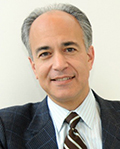 Neil Fishman is the Chief Medical Officer at HUP. His current responsibilities include oversight of Quality and Safety, Regulatory Affairs, Capacity Management and Patient Flow (including the Admissions Center), Case Management and Social Work, Antimicrobial Stewardship, Infection Control, Professionalism, and HUP’s Clinical Effectiveness Teams. Dr. Fishman is an infectious diseases physician who initially entered the quality arena when he and his team designed and implemented the first Antimicrobial Stewardship Program in the U.S., which was designed to improve the way physicians use antibiotics and to limit the emergence of resistance. This program remains a national model for efforts to improve antimicrobial use in the acute care setting. His research career has focused on the epidemiology of, risk factors for, and interventions to limit the emergence of resistance. He is a past president of the Society for Healthcare Epidemiology of America and a past chair of the Healthcare Infection Control Practices Advisory Committee to the CDC. Dr. Fishman also served on the working group for the Report on Antibiotic Resistance from the President’s Council of Advisors on Science and Technology. Dr. Fishman leads biohazard response efforts for HUP and guided the entity’s responses to H1N1, Ebola, and most recently the COVID-19 pandemic. He helped lead an interdisciplinary team that developed guidelines for the care of patients infected with SARS-CoV-2, as well as efforts to guarantee the safety of all staff and students, and organized educational efforts to disseminate these initiatives. Dr. Fishman also helped organize the COVID-19 vaccination site at HUP. One of his former trainees stated that “Neil is clearly a very experienced clinician and was a pleasure to learn from. He is efficient and cared about balancing a very busy HUP service with my learning as a fellow.”
Neil Fishman is the Chief Medical Officer at HUP. His current responsibilities include oversight of Quality and Safety, Regulatory Affairs, Capacity Management and Patient Flow (including the Admissions Center), Case Management and Social Work, Antimicrobial Stewardship, Infection Control, Professionalism, and HUP’s Clinical Effectiveness Teams. Dr. Fishman is an infectious diseases physician who initially entered the quality arena when he and his team designed and implemented the first Antimicrobial Stewardship Program in the U.S., which was designed to improve the way physicians use antibiotics and to limit the emergence of resistance. This program remains a national model for efforts to improve antimicrobial use in the acute care setting. His research career has focused on the epidemiology of, risk factors for, and interventions to limit the emergence of resistance. He is a past president of the Society for Healthcare Epidemiology of America and a past chair of the Healthcare Infection Control Practices Advisory Committee to the CDC. Dr. Fishman also served on the working group for the Report on Antibiotic Resistance from the President’s Council of Advisors on Science and Technology. Dr. Fishman leads biohazard response efforts for HUP and guided the entity’s responses to H1N1, Ebola, and most recently the COVID-19 pandemic. He helped lead an interdisciplinary team that developed guidelines for the care of patients infected with SARS-CoV-2, as well as efforts to guarantee the safety of all staff and students, and organized educational efforts to disseminate these initiatives. Dr. Fishman also helped organize the COVID-19 vaccination site at HUP. One of his former trainees stated that “Neil is clearly a very experienced clinician and was a pleasure to learn from. He is efficient and cared about balancing a very busy HUP service with my learning as a fellow.”
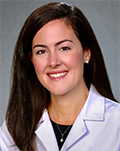 Kathleen M. Murphy is an assistant professor of clinical medicine in the division of infectious diseases and the associate hospital epidemiologist at HUP. She received her medical degree from the University of Michigan Medical School and completed her internal medicine residency, chief resident year, and fellowship in infectious diseases at Penn before joining the faculty in July 2019. During her time as an ID fellow at Penn, she also completed the Measey Medical Education Fellowship and was the recipient of the Outstanding ID Clinical Fellow Award in 2018. Her clinical time is primarily spent caring for immunocompromised patients in the Transplant and Oncology Infectious Diseases services. She has an interest in both undergraduate and graduate medical education, and has enjoyed working with medical students through the Introduction to Clinical Medicine and Differential Diagnosis courses, during the second year Infectious Diseases course, and during their time rotating on the ID consult services at HUP. Through her associate hospital epidemiologist role, she has helped HUP navigate the COVID-19 pandemic, and she received the Andrew I. Schafer Award in Leadership in Medicine in June 2020 for her work in the pandemic response. She has collaborated closely with PSOM leadership throughout the COVID-19 pandemic to ensure the safety of students both in the classroom and during clinical rotations, and to keep students informed regarding UPHS COVID-19 policies and procedures. One of her former trainees stated that she “is one of the most well-put-together attendings I have ever worked with. She is incredibly responsive, hard-working, approachable, fun, enthusiastic, kind and patient. I love working with her. She always does a tremendous amount of teaching and she is also so efficient. I can only hope to be a fraction of the attending that Kathleen is one day.”
Kathleen M. Murphy is an assistant professor of clinical medicine in the division of infectious diseases and the associate hospital epidemiologist at HUP. She received her medical degree from the University of Michigan Medical School and completed her internal medicine residency, chief resident year, and fellowship in infectious diseases at Penn before joining the faculty in July 2019. During her time as an ID fellow at Penn, she also completed the Measey Medical Education Fellowship and was the recipient of the Outstanding ID Clinical Fellow Award in 2018. Her clinical time is primarily spent caring for immunocompromised patients in the Transplant and Oncology Infectious Diseases services. She has an interest in both undergraduate and graduate medical education, and has enjoyed working with medical students through the Introduction to Clinical Medicine and Differential Diagnosis courses, during the second year Infectious Diseases course, and during their time rotating on the ID consult services at HUP. Through her associate hospital epidemiologist role, she has helped HUP navigate the COVID-19 pandemic, and she received the Andrew I. Schafer Award in Leadership in Medicine in June 2020 for her work in the pandemic response. She has collaborated closely with PSOM leadership throughout the COVID-19 pandemic to ensure the safety of students both in the classroom and during clinical rotations, and to keep students informed regarding UPHS COVID-19 policies and procedures. One of her former trainees stated that she “is one of the most well-put-together attendings I have ever worked with. She is incredibly responsive, hard-working, approachable, fun, enthusiastic, kind and patient. I love working with her. She always does a tremendous amount of teaching and she is also so efficient. I can only hope to be a fraction of the attending that Kathleen is one day.”

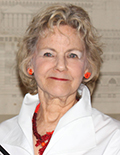 The Arthur Ross Gallery announces a gift of $125,000 from Susan T. Marx, CW’66, to endow the Susan T. Marx Distinguished Lecture Series in perpetuity. Established in 2015, the Marx lectures feature significant art world leaders and artists who address timely issues in the arts.
The Arthur Ross Gallery announces a gift of $125,000 from Susan T. Marx, CW’66, to endow the Susan T. Marx Distinguished Lecture Series in perpetuity. Established in 2015, the Marx lectures feature significant art world leaders and artists who address timely issues in the arts.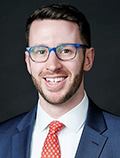 Sam Duplessis has joined the Penn Libraries as director of advancement. Mr. Duplessis leads the advancement team and will work to advance the Libraries’ fundraising program in support of its strategic plan.
Sam Duplessis has joined the Penn Libraries as director of advancement. Mr. Duplessis leads the advancement team and will work to advance the Libraries’ fundraising program in support of its strategic plan. .jpg) John M. Daly, the former Jonathan E. Rhoads Professor of Surgery in Penn’s School of Medicine, and later twice the dean of Temple University’s Lewis Katz School of Medicine, died at home in Philadelphia on March 26. He was 73.
John M. Daly, the former Jonathan E. Rhoads Professor of Surgery in Penn’s School of Medicine, and later twice the dean of Temple University’s Lewis Katz School of Medicine, died at home in Philadelphia on March 26. He was 73. 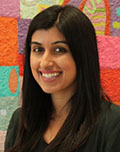 Assistant professor of law Natasha Sarin is taking a public service leave from the University of Pennsylvania Carey Law School’s faculty to join the Biden Administration as a Deputy Assistant Secretary for Economic Policy at the Treasury Department. She joined the Law School in the fall of 2018 with a secondary appointment in the finance department of the Wharton School.
Assistant professor of law Natasha Sarin is taking a public service leave from the University of Pennsylvania Carey Law School’s faculty to join the Biden Administration as a Deputy Assistant Secretary for Economic Policy at the Treasury Department. She joined the Law School in the fall of 2018 with a secondary appointment in the finance department of the Wharton School.
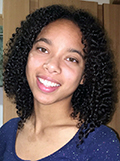
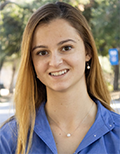 Three University of Pennsylvania undergraduates in the School of Arts & Sciences have received 2021 Goldwater Scholarships, awarded to sophomores or juniors planning research careers in mathematics, the natural sciences, or engineering.
Three University of Pennsylvania undergraduates in the School of Arts & Sciences have received 2021 Goldwater Scholarships, awarded to sophomores or juniors planning research careers in mathematics, the natural sciences, or engineering.